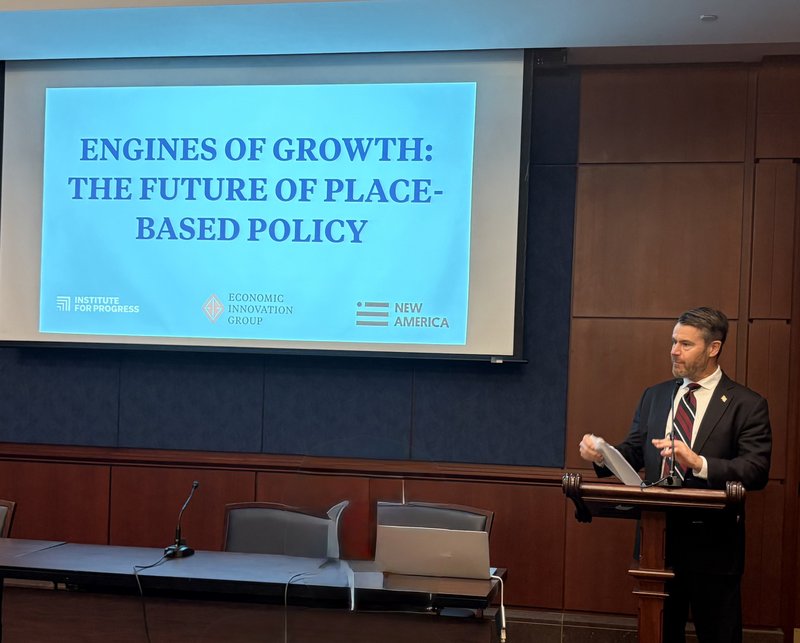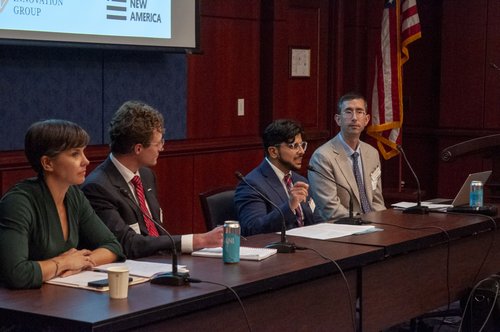NSF Engines, Place-based Innovation on the Minds of Bipartisan Policymakers
Members of Congress, Engines CEOs, private sector leaders, and policy experts share why funding for NSF is critical for the nation's workers, economy, and security.
Blog Post

New America
Sept. 25, 2025
This article was produced as part of New America’s Future of Work and the Innovation Economy Initiative. Share this article and your thoughts with us on X, Bluesky, Facebook, and LinkedIn, and subscribe to our Future of Work Bulletin newsletter to stay current on our latest research, events, and writing.
In two events last week, Members of Congress from both sides of the aisle emphasized the importance of place-based innovation ecosystems like the U.S. National Science Foundation’s Regional Innovation Engines to tech-based economic development and national security. NSF Engines are regional consortia of public and private sector partners that advance applied research, technology development, and workforce training in order to grow industries rooted in emerging technologies.
Engines CEOs, private sector leaders, and policy experts doubled down on the program’s unique value-added to the national technology leadership toolbox.
Engines Exemplify Benefits of Public-Private-Partnership
Opening an event hosted by New America's Future of Work & Innovation Economy initiative, titled NSF Engines: A 21st-Century Approach to Drive U.S. Competitiveness and Economic Renewal Through Emerging Tech Leadership, Representative Julie Letlow (R-LA) highlighted that the partnership between Louisana State University and Cornerstone Chemical Company through the FUEL NSF Engine in her district “will help ensure that America is energy dominant for years to come.” Please see full remarks in the video below. Michael Mazzola, CEO of the FUEL NSF Engine in Louisiana, and Matt Sokol, CEO of Cornerstone Chemical Company, shared how the work they’ve been able to do together has benefited the region’s workers and economy and contributed to the chemical industry’s ever-growing need for skilled workers.
Representative Bill Foster (D-IL) called the NSF Great Lakes RENEW Engine’s work to combine technology development and workforce training in service of water and energy security “the ultimate application of the NSF,” adding that “water powers industries from data centers to advanced manufacturing, and now more than ever we must be sure that this nation leads into the next generation” (full remarks in the video below). Alaina Harkness, CEO of NSF Great Lakes RENEW Engine, and Brian Baker, President and CEO of Sentry Equipment Corp, shared how the work made possible by NSF has advanced technology allowing for clean water and energy production: two evergreen needs for a secure nation. Baker shared further that the kind of innovation and skill development happening now would not be possible for the area without the public investment.
Engines Deserve Continued Support to Prove Concept
Policy experts agreed that the Engines program shows significant promise for not only the regions with an engine but also the nation. We are only two years into a five-year authorization for NSF Engines and are already seeing some unique benefits.
Joseph Parilla, Senior Fellow and Director of Applied Research at the Brookings Institution, explained how Engines are addressing three of our country’s biggest challenges: maintaining continuous economic prosperity and security through technology and energy transition during a very different fiscal environment for government while delivering economic opportunity for Americans. Engines are not a one-size-fits-all answer–the program creates incentives for leaders like Mazzola and Harkness to bring together the assets of their region to address these challenges uniquely. The program’s design “creates CEOs who can empower regional institutions to operate in this new way.”
Shalin Jyotishi, Founder and Managing Director of the Future of Work & Innovation Economy initiative at New America, described how Engines is putting Paul Romer’s Nobel-Prize-winning research underpinning the Endogenous Growth Theory into practice, which showed how policies, institutions, and incentives that focus on factors like education, R&D, intellectual property, and openness help catalyze long-term economic growth. Jyotishi emphasized that the Engines program is not only operationalizing the model in communities but building the NSF's capacity to support programs like Engines in the future, referencing the Technology, Innovation, and Partnerships directorate. The NSF Engines have secured $1 billion of non-governmental money to complement $135 million from the federal government–a near ten-fold return on the dollar.
Ian Banks, Director of Science Policy at the Foundation on American Innovation, emphasized that Engines are being organized around key technology areas that are essential to national security. “We know the technologies that will drive the course of competition in a variety of ways, and we are choosing to invest in this area.” Banks concurred with the description of Engines helping to operationalize the Endogenous Growth Theory, stating that “growth doesn’t come from nowhere; it comes from ideas. And people in communities have more and better ideas,” He added that organizing federal investments in line with this theory and around key technology areas makes common sense and “makes the federal dollar go further.”
Engines Help Secure Global Leadership and Domestic Competitiveness
An event later in the week, hosted by Economic Innovation Group (EIG) in partnership with the Institute for Progress and New America, titled, Engines of Growth: The Future of Place-Based Policy brought policymakers and congressional staff into the room to celebrate the announcement of the fifteen finalists for the second round of Engines and further highlighted the dual purposes of the program. The finalists for the second cohort of NSF Engines focus on catalyzing innovation in industries as broad as seafood innovation to our quantum future.

In a discussion moderated by EIG Senior Fellow Kenan Firki, Banks and Jyotishi further expanded on the empirical case and future potential of the NSF Engines program, while Harkness shared more about the NSF Great Lakes RENEW Engine, drawing a clear line between the work they are doing regionally with national security. “Water security is national security,” Harkness emphasized. Across six states in the Great Lakes, the work made possible by NSF Engines will address the aging water workforce, training the next generation of water and sanitation workers, chemical engineers, and other necessary roles. The recovery of critical materials from water will help provide power, and the removal of harmful chemicals will improve the health of residents. The Great Lakes house one-fifth of the world’s fresh water. Maintaining access to this is imperative for our not-so-distant future.
Senator Todd Young (R-IN) closed the event, sharing that NSF Engines “represent the very best of what can happen when we have cross-sectoral collaboration,” ensure innovation is dispersed throughout the country, and help the US maintain its position as a global leader.
It is clear on both sides of the aisle that the NSF Engines program has shown success already and potential for even more benefits in the years to come, if given the required resources. As Congress finalizes its budget allocations for the NSF, the Engines program rises as a bipartisan priority for expanded support.